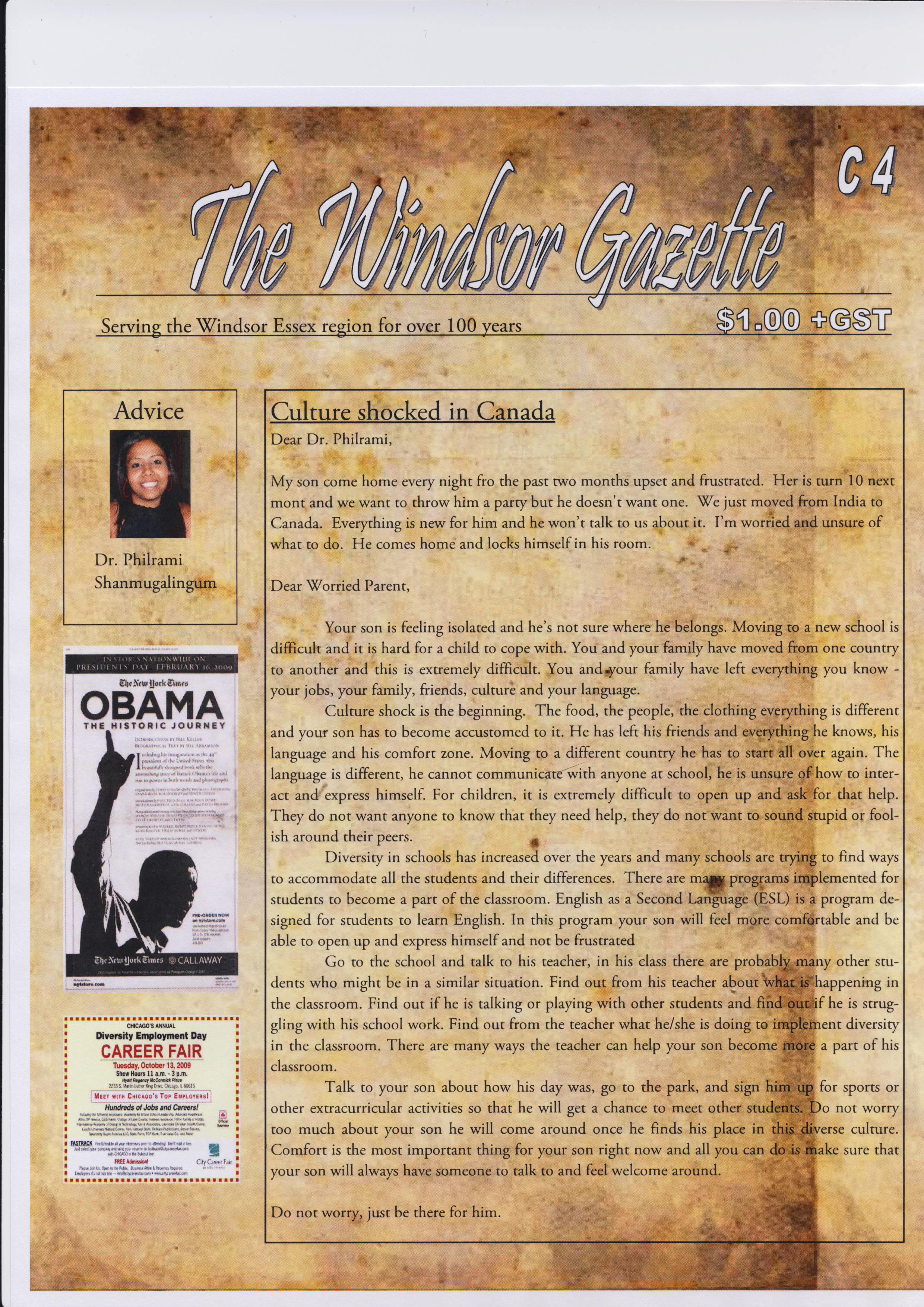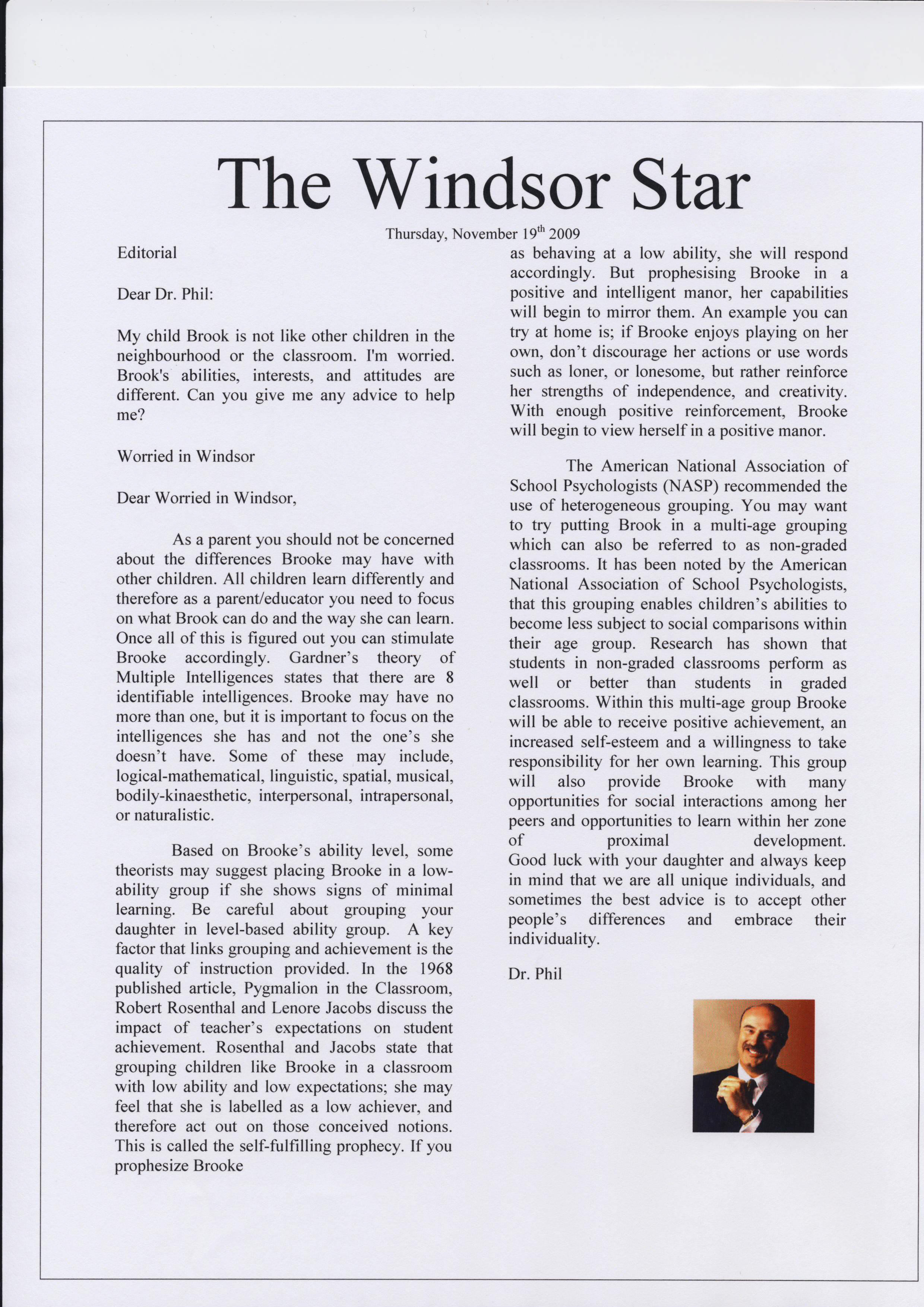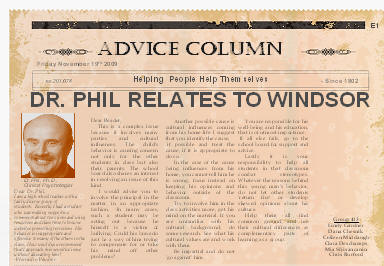|

| |
|
|
| |
|
| |
| Group 140 |
 |
| |
|
| |
| Group 205 |


Dear Dr.
Phil:
My child Brook is not like other children in the
neighbourhood or the classroom. I'm worried. Brook's
abilities, interests, and attitudes are different. Can you
give me any advice to help me?
Worried in Windsor
Dear Worried in Windsor,
This is a common concern many
parents are expressing these days. Parents habitually have a
tendency to compare their own children with other children
in abilities, personality, and interests; even though they
know that each child is different. It is difficult for me to
discuss the issues that are contributing to how Brooke is
acting and feeling because I do not have tangible facts
about Brooke, for example her age, grade level and
interests, but I can certainly provide general ideas,
concepts, and theories for you to consider.
To really understand individual
differences among students one must focus on intelligence
and ability. One of the leading experts in this area is
Howard Gardner. Gardner's theory argues that intelligence,
particularly as it is traditionally defined, does not
sufficiently encompass the wide variety of abilities humans
display. We all know of children and students who didn't fit
the mold; the students were bright for example, but didn't
excel on tests. Gardner claims that there are eight
different kinds of intelligence. He also states that we
should focus on what a student can do well, instead of
dwelling on what they can’t do. This idea of “Multiple
Intelligence” has enabled many struggling parents and
teachers to take a different approach. It has also helped
them to teach and evaluate children in new and better ways.
The 8 different kinds of intelligence
as stated by Gardner include;
 | Linguistic intelligence:
sensitivity to the meaning and order of words. |
 | Logical-mathematical
intelligence: ability in mathematics and other complex
logical systems. |
 | Musical intelligence: the
ability to understand and create music. Musicians,
composers and dancers show a heightened musical
intelligence. |
 | Spatial intelligence: the
ability to "think in pictures," to perceive the visual
world accurately, and recreate (or alter) it in the mind
or on paper. Spatial intelligence is highly developed in
artists, architects, designers and sculptors. |
 | Bodily-kinesthetic
intelligence: the ability to use one's body in a skilled
way, for self-expression or toward a goal. Mimes,
dancers, basketball players, and actors are among those
who display bodily-kinesthetic intelligence. |
 | Interpersonal intelligence:
an ability to perceive and understand other individuals
-- their moods, desires, and motivations. Political and
religious leaders, skilled parents and teachers, and
therapists use this intelligence. |
 | Intrapersonal intelligence:
an understanding of one's own emotions. Some novelists
and or counselors use their own experience to guide
others. |
Another popular approach to thinking
about intelligence from a practical perspective is Robert
Sternberg’s “Triarchic” Theory of Human Intelligence. This
theory involves three facets of intelligence; Analytical,
Creative and Practical. Analytical intelligence is similar
to the standard psychometric definition of intelligence, ie,
academic problem solving. The second facet, Creative
intelligence as explained by Sternberg, is
the ability which allows people to think creatively and that
which allows people to adjust creatively and effectively to
new situations. The final component is Practical
intelligence and involves the ability to grasp, understand
and deal with everyday tasks.
As you
can see, these theories are good starting points and
examples of how every child is different and allows us to
look at their individual strengths and weaknesses and what
areas of intelligence they need to improve on. It is likely
that Brooke excels in certain areas but not in others. It is
critical for you as a mother to not judge Brooke and view
her behavior as abnormal. You must empathize with Brooke and
let her see that just because her abilities and behavior are
different than those in the neighborhood and classroom, she
is just as special and important as every other child. I
would advise sitting down with Brooke and having a real
‘heart to heart’. You need to be aware of what concerns and
frustrations she has. For all we know at this stage, Brooke
may be extremely gifted and capable. She may find it hard
to relate to her peers and may be bored at school. At this
stage I feel that it is essential that you, Brooke and her
teacher all sit down together and find a solution
collaboratively. Learn more about Brooke so you can
understand her better. Encourage her to talk to you
about her feelings. This will promote closeness and create a
stronger bond.
Good Luck,
Dr. Phil
What is the mailing address for Dr. Phil?
Dr.
Phil show
5482 Wilshire Boulevard #1902
Los Angeles, CA 90036
Due to
the volume of mail received, letters, photographs, legal
documents, medical materials, manuscripts and other personal
items cannot be returned. Please consider this when sending
original items.
Materials other than letters are not usually reviewed. You
may choose to spare the expense and effort of sending
further documentation unless requested by our producers.
Money
and checks should not be sent to the Wilshire Blvd. address.
To purchase merchandise,
click here. to buy a tape or transcript,
click here.
Nearly
every guest on the show starts with a letter or e-mail to
us, and we look forward to your thoughts, comments, concerns
and stories.
Group
205
Ardeshir Assadi, Georgia Galt, Robyn Jossul, Tammy Tran,
Dan Lumley, Heather Tupling
|
|
| |
| Group 201 |

Dear: Worried
in Windsor,
Please do not fret about Brooke. Students are all different
in many aspects of lives. According to John Dewey, all
children differ in many aspects of life including:
temperament, enthusiasm, distractibility, motivation, and
prior knowledge in different subjects, just to name a few.
Therefore, if Brooke is lacking in one of the aspects listed
above, it is normal as all children are not the same and we
all develop at different speeds. Brooke may just be lagging
behind those in her community and school, but it does not
necessarily mean that there is anything to worry about.
We
have to be optimistic here and look at the situation as
wonderfully rich instead of hopeless, as you need to show
Brooke that you are there for him/her. Furthermore, it is
important that you understand that although Brooke may be
displaying underachievement in certain areas he/she
could have strengths in others and it is important to focus
on the strengths more so than the weaknesses. To improve
Brooke’s weaknesses, you could partner the strengths with
the weaknesses as Brooke’s strengths could provide a model
for the weaknesses. For example, if Brooke is strong
musically they could listen to a song while following along
with the lyrics to assist in the weaker area of reading.
Howard Gardner, a famous psychologist, has identified eight
forms of intelligence. These consist of:
logical-mathematical, visual-spatial, linguistic, musical,
naturalist, interpersonal, intrapersonal, and
bodily-kinesthetic. With having eight different forms of
intelligence, Brooke will be strong in at least one of them.
Brooke may not be the strongest person when it comes to
school, interests, or attitudes, but he/she will be strong
in at least one form of intelligence.
Remember, an area that Brooke is strong in would be what
he/she enjoys doing the most, so we need to be monitoring
the activities Brooke is doing so we can learn from it.
Furthermore, we need to remember that talents are not
ingrained, but acquired by practice so experience and
practice is what leads to talent. To determine Brooke’s
talents, look at the desires to develop it further which
include enjoyment, valuing, and external support. If Brooke
receives no support for doing a certain activity, he/she
will no longer to continue to do that activity which brings
us back to being supportive of

 his/her decisions.
Below is a chart that depicts the factors that contribute to
the development of a talent.
If none of
the above seems to improve Brooke’s case or if you are
having doubts, you could go to a psychologist and get an
assessment done. However, before doing that I would talk to
Brooke as he/she may know that these differences exist and
maybe just talking about them would help the situation as it
would show that you care about him/her.
It
is important that you praise effort rather than intelligence
because if children believe they can improve their abilities
through hard work they are more apt to put forth the
necessary effort that is required to succeed. Keep in mind
that there are famous people in our world who have conquered
their disadvantages and these include: Albert Einstein,
Winston Churchill, and John Irving. So just remember that if
Brooke does have a disadvantage of some form, he/she will
overcome it in the end, they just need support and
encouragement.*
Group 201 à Morgan
Cooper, Ryan King, Sylvia Marques, Mike Plantus, Tonia Fitch
|
|
| |
| Group 408 |
 |
|
| |
| Group 214 |
 |
|
| |
| Group 413 |
 |
|
| |
|